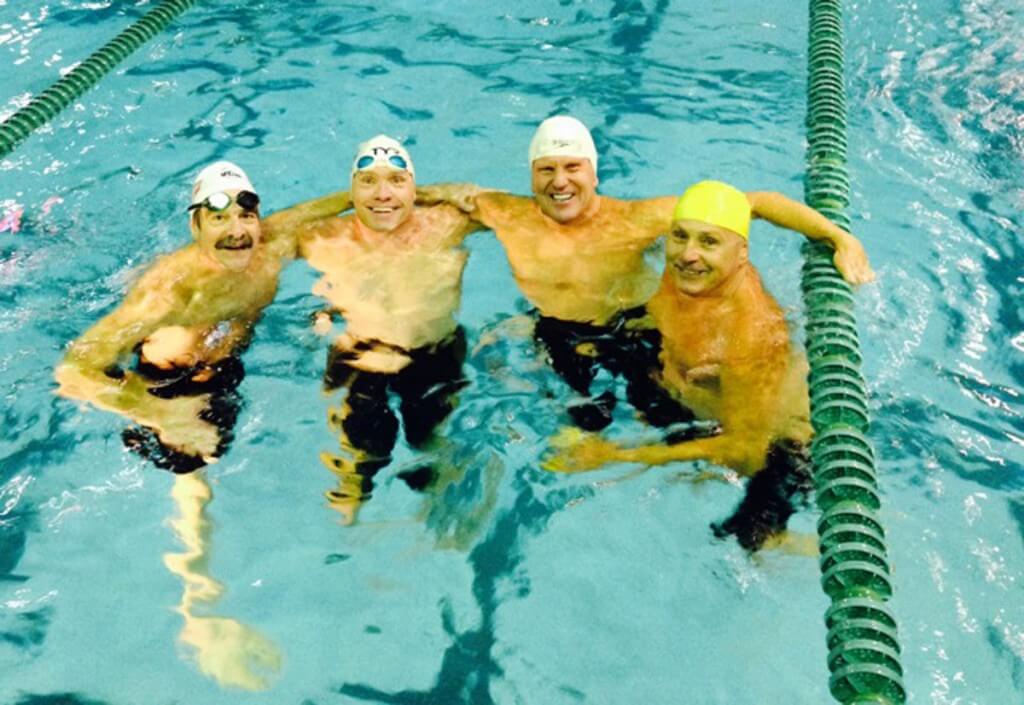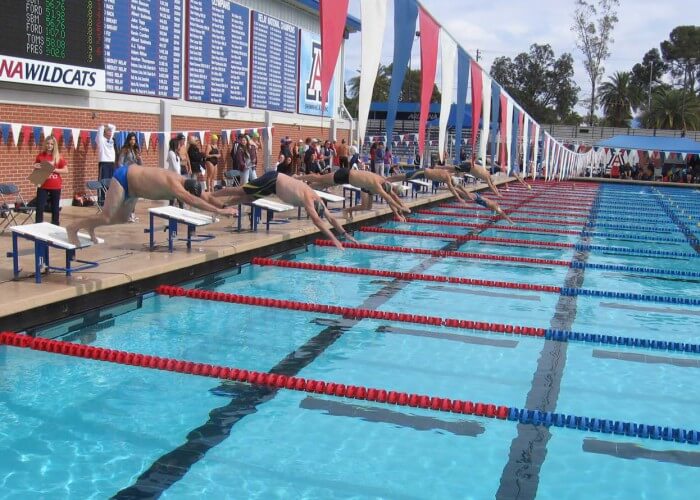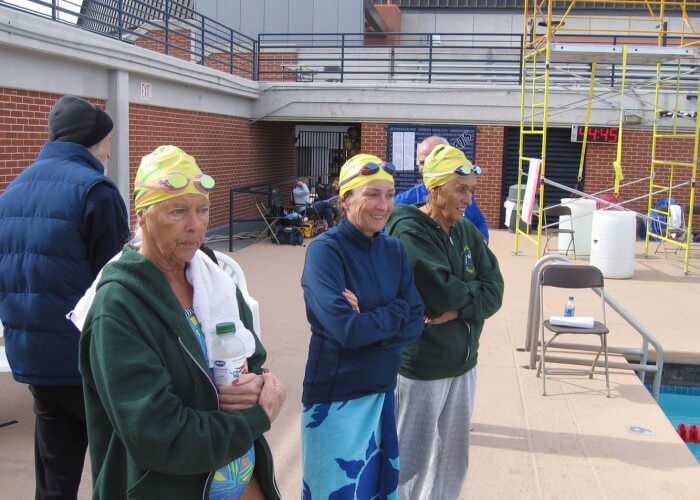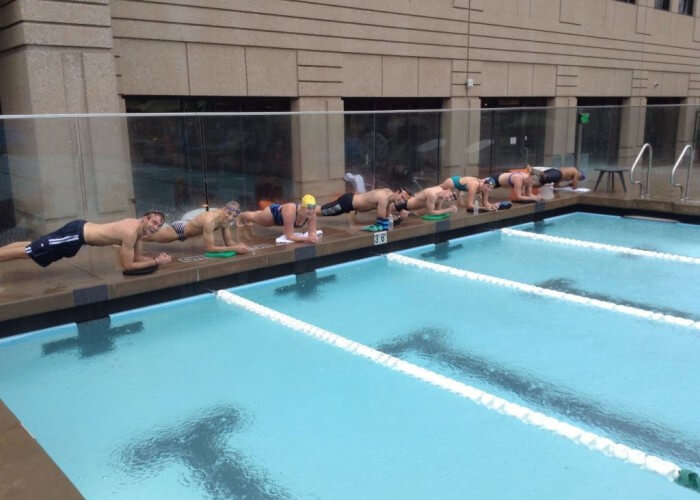5 Reasons To Consider Masters Swimming

By Seren Jones, Swim World College Intern
Gareth Cocks has had “a little success.”
He holds 17 Welsh records; eight long course and nine short course. He finished seventh and third in the 100 and 200 meter butterfly at the 2014 FINA World Masters Swimming Championships in Montreal, and currently sits at the top of the British rankings for the 100 and 200 meter butterfly events in his age group.
Carolyn Koster is an optician in a private practice optometry office. Koster swam through age group to high school to college at Rochester Institute of Technology, where she was inducted into the institution’s sports Hall of Fame. Koster has been a Masters swimmer since 1994, and has 63 national top ten times to her name.
Gareth Cocks and Carolyn Koster are both Masters swimmers.
Despite their teams being on opposite sides of the pond – Cocks based at Cardiff Masters, in Wales, UK, and Koster at Long Island University’s (LIU Post) Masters Program in New York – the two reason why retired club and college swimmers should consider the transition to Masters swimming.
1. You’re the boss.
Masters swimming allows you to train to whatever standard you desire as little or as often as you wish. Unlike club and college swimming, your workouts revolve around your life, which for an ex-club or college swimmer, almost seems to good to be true.
“As I’m at an age where I have to work for a living, the Masters training fits nicely around my work life, whereas I never would have been able to continue club swimming with my career,” 26-year-old Cocks said. “Unlike club, you don’t have to swim for 20 hours a week, so it allows you to have a life as well.”
2. You will fit into one of the many stereotypes it has to offer.
Masters swimming caters for all ages and abilities ranging from freshly retired club or college swimmers looking to fight the swammer weight gain to the “swim nerds” who just can’t hang up their goggles. There are also those who are more relaxed and do it for the social aspect, or those who swim to compliment their primary sport. Some even use the sport as a therapeutic release, and others just swim as a hobby.
“When I first joined Masters, I figured it would be full of old people swimming really slowly, but it’s really not,” Cocks said. “Yes, there are old people but there are also young people as well. The standard is also quite good. I find that even though most masters swimmers aren’t able to train that much, there is still a lot of competition within the individual age groups.”
Whether you are in it to keep fit or to continue competing, there is a vacancy for everyone.
3. You become part of a community.
Entering Masters swimming is like entering a new family: your presence is embraced with a warm (and chlorinated) welcome. Such an advantage is particularly appreciated when beginning a new chapter in life, such as leaving college along with your student-athlete lifestyle that provided numerous friends and teammates.
“I like the feeling of comradery and the forging of friendships with people you would never meet through the normal course of your life,” Koster said. “I have been swimming Masters since 1994 and I have met a lot of really great people.”
“The atmosphere is always really good, especially at meets,” Cocks said. “Everyone is always friendly to each other, regardless of who wins.”
Because many swimmers in your new community have similar experiences to yourself, you are almost guaranteed instant friends. Who would turn down instant friends?
4. You will almost never swim for two hours.
Unlike club and college, Masters sessions usually last between an hour and an hour and a half, MAX. Although the sessions may be aerobic and tedious at times, after four years of intense college swimming, with at least another eight years of club swimming prior, it’s a walk in the park. A splash in the pool even.
And if for some reason you do have a two-hour session, you can probably get out early. Remember, you’re the boss.
5. It’s a REALLY good workout.
Of course, you are aware of how good a workout swimming is. It’s one of the only sports that works the entire body as well as several fitness components simultaneously, which explains why we’re in such good shape. It also has less of an impact on your joints than dry land sports, due to the cushion of the water. According to Bucknell University, the water provides 12-14 percent more resistance than when you exercise on land.
“I remain fit and keep myself in good physical form,” Cocks said. “I like swimming as exercise and I get to carry on competing and in some cases improving my times.”
Koster agrees that swimming helps her maintain a healthy lifestyle.
“I swim to stay in shape and be healthy. Also swimming Masters allows me to watch inspiring performances throughout the age groups, especially the 80-year-olds!”
Although it may seem nauseating to consider getting back into the water after you’ve officially retired, it may actually be worth the splash.







Hannah Kathryn
One day, one day haha
I only need one, Jaring Timmerman.
الملوك
Teymour Ghaleb
My sentiments exactly. A great summary of what Masters swimming is all about.
My sentiments exactly. A great summary of what Masters swimming is all about.
Yup
Great read! 🙂
Carolyn Koster Gareth Cocks Malin Hedberg a short read for my fave masters 🙂
Eric T. Ebeling
Lovely article Seren! Swimming will always be a part of my life ❤ Maybe I’ll take up competitive masters swimming in a couple of years ?